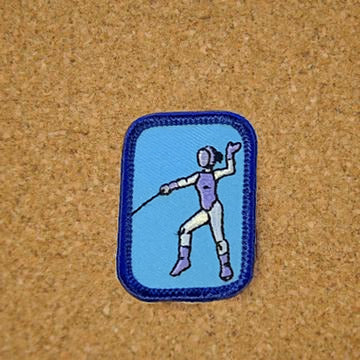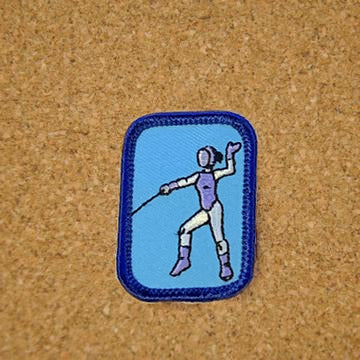Fencing (IP)
Fencing (IP)
67 in stock
Couldn't load pickup availability
Fencing Interest Project Patch
(If you attended a fencing event you have earned this patch)
Earn this IP by completing the 2 * (starred) Skill Builder activities, 1 Technology activity, 1 Service Project activity, 1 Career Exploration activity, and 2 other activities of your choice from any of the sections. (You must complete the starred activities)
Skill Builders:
1. *Getting Started: Warming up the muscles which will be used is an important part of any exercise or sport. Learn which muscle groups are used most in the sport of Fencing and develop a warm-up routine which can be incorporated into your Fencing workouts to prevent muscle injury.
2. *Safety: Learn the safety rules which must be followed to prevent injuries to yourself or fellow fencers. Why is each rule important? What other “etiquette” rules are also important? Learn the names and purposes of the protective gear used in fencing. Understand the importance of proper fit.
3. Learn the vocabulary of fencing. Be able to explain the meaning of the following terms: Advance, Attack, Bout, Engagement, En Garde, Feint, Lunge, Parry, Retreat, Riposte and Thrust.
4. Learn about the weapons used in Sport fencing. What are the differences in the history and design of a Foil, Epee or Sabre? How are each of them used differently?
5. Learn about the weapons used in Historical Swordsmanship. What are the differences between the Long sword, Broadsword, Rapier, and Katana? How does Historical fencing differ from Sport fencing?
6. Learn to perform the basic moves in either Sport fencing or Historical Swordsmanship, using either the foil or shinai. Practice these moves under the supervision of an instructor. When you feel ready, practice fencing with another student at your same level.
Technology:
1. Learn the difference between “dry” fencing and “electric” fencing. Why is electric fencing more common in competitions? What special equipment is used for electric fencing?
2. Visit a fencing equipment store and learn about the materials used in the manufacture of fencing equipment. What are the advantages and disadvantages of each? Compare the features of different brands of equipment available.
3. Learn about tightening the grips on weapons, and the importance of doing this correctly. Learn about maintaining fencing equipment between uses and preparing equipment for use.3
4. Watch a video about fencing. Make a list of new things you have learned or questions you want to ask an experienced fencer.
5. Learn how a fencing competition is scored. Watch a fencing match on television or video and score the competitors. Analyze the qualities of the top fencers.
Service Projects:
1. Do research to learn where fencing is taught in your area. Prepare a brochure for your Service Unit or Council to let other Girl Scouts know where they can learn about fencing.
2. Spread the word! Promote the sport of fencing by telling what you have learned or giving a demonstration to your troop or a group of younger Girl Scouts.
3. Write an article for your school newspaper about fencing. See if you can get enough interest to start a fencing club at your school.
4. Prepare a photo essay or video about fencing and share it with others.
5. Volunteer to help at a local fencing competition.
Career Exploration:
- Interview two persons whose jobs relate to fencing and find out how they became involved. Examples include a fencing instructor/coach, equipment salesperson, weaponry repair and maintenance, or owner of a fencing school.
- Invite a Fencing Master to talk to your group or troop about fencing. Find out what type of certification he/she holds and the different competitions he/she has participated in. How long did it take him to achieve this level? How has this achievement affected his career?
- Research one or more members of the U.S. Olympic fencing team. Find out what their greatest career accomplishment was and what they did after retiring from competitive fencing. What effect did fencing have on their later careers?
- Research which colleges offer fencing programs and/or Scholarships. What are the requirements for a fencing scholarship?


